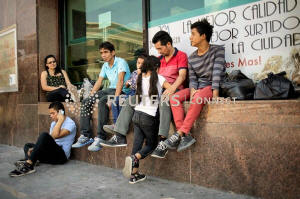Hasty rollout of Trump immigration policy has 'broken' border courts
 Send a link to a friend
Send a link to a friend
 [September 10, 2019]
By Mica Rosenberg, Kristina Cooke and Reade Levinson [September 10, 2019]
By Mica Rosenberg, Kristina Cooke and Reade Levinson
(Reuters) - On the day she was set to see a
U.S. immigration judge in San Diego last month, Katia took every
precaution.
After waiting two months in Mexico to press her case for U.S. asylum,
the 20-year-old student from Nicaragua arrived at the border near
Tijuana three hours before the critical hearing was scheduled to start
at 7:30 a.m.
But border agents didn't even escort her into the U.S. port of entry
until after 9 a.m., she said, and then she was left stranded there with
a group of more than a dozen other migrants who also missed their
hearings.
"We kept asking what was going on, but they wouldn't tell us anything,"
said Katia, who asked to be identified by her first name only for fear
of jeopardizing her immigration case.
Bashir Ghazialam, a lawyer paid for by Katia's aunt in the United
States, convinced the judge to reschedule her case because of the
transportation snafu. Later, staff at the lawyer's office learned that
at least two families in the group were ordered deported for not showing
up to court.
Since it started in January, the rollout of one of the most dramatic
changes to U.S. immigration policy under the Trump administration has
been marked by unpredictability and created chaos in immigration courts,
according to dozens of interviews with judges and attorneys, former
federal officials and migrants.

The program - known as the "Migrant Protection Protocols" (MPP) - has
forced tens of thousands of people to wait in Mexico for U.S. court
dates, swamping the dockets and leading to delays and confusion as
judges and staff struggle to handle the influx of cases.
In June, a U.S. immigration official told a group of congressional
staffers that the program had "broken the courts," according to two
participants and contemporaneous notes taken by one of them. The
official said that the court in El Paso at that point was close to
running out of space for paper files, according to the attendees, who
requested anonymity because the meeting was confidential.
Theresa Cardinal Brown, a former Department of Homeland Security
official under presidents Barack Obama and George W. Bush, said the
problems are "symptomatic of a system that's not coordinating well."
"It's a volume problem, it's a planning problem, it's a systems problem
and it's an operational problem on the ground," said Brown, now a
director at the Bipartisan Policy Center think tank. "They're figuring
everything out on the fly."
U.S. Customs and Border Protection (CBP) estimated that 42,000 migrants
had been sent to wait in Mexico through early September. That agency and
the Executive Office for Immigration Review (EOIR), which runs the
nation's immigration courts, referred questions about the program's
implementation to the Department of Homeland Security (DHS), which did
not respond to requests for comment.
HUGE SURGE, FEW COURTS
The disarray is the result of a surge in migrants, most of them Central
Americans, at the U.S. southern border, combined with the need for
intricate legal and logistical arrangements for MPP proceedings in a
limited number of courts - only in San Diego and El Paso, initially.
Rather than being released into the United States to coordinate their
own transportation and legal appearances, migrants in MPP must come and
go across the border strictly under U.S. custody.
Some migrants have turned up in court only to find that their cases are
not the system or that the information on them is wrong, several
attorneys told Reuters. Others, like Katia, have received conflicting
instructions.

According to court documents seen by Reuters, Katia's notice to appear
stated that her hearing was at 7:30 a.m., while another paper she
received said she should arrive at the border at 9 a.m., well after her
hearing was set to start. She decided to show up at the border before
dawn, according to staff in her lawyer's office. Still, she wasn't
allowed into the border facility until hours later. Ultimately she was
never bussed to the San Diego court and was told her case was closed - a
fate she was able to avoid only after frantically summoning her lawyer,
Ghazialam, to the border.
Most migrants in MPP - including the two families who were deported from
her group at the port of entry - do not have lawyers.
In open court, judges have raised concerns that migrants in Mexico -
often with no permanent address - cannot be properly notified of their
hearings. On many documents, the address listed is simply the city and
state in Mexico to which the migrant has been returned.
Lawyers say they fear for the safety of their clients in high-crime
border cities.
A Guatemalan father and daughter were being held by kidnappers in Ciudad
Juarez at the time of their U.S. hearings in early July but were ordered
deported because they didn't show up to court, according to court
documents filed by their lawyer, Bridget Cambria, who said she was able
to get their case reopened.
[to top of second column]
|

Honduran migrants rest after returning to Mexico from the U.S. under
the Migrant Protection Protocol (MPP) to wait for their court
hearing for asylum seekers, in Ciudad Juarez, Mexico, July 18, 2019.
REUTERS/Jose Luis Gonzalez/File Photo

Adding to uncertainty surrounding the program, the legality of MPP
is being challenged by migrant advocates. An appellate court ruled
in May that the policy could continue during the legal battle, but
if it is found ultimately to be unlawful, the fate of the thousands
of migrants waiting in Mexico is unclear. A hearing on the merits of
the case is set for next month.
'UNREALISTIC' NUMBERS
When the MPP program was announced on December 20, then-Homeland
Security Secretary Kirstjen Nielsen said one of its "anticipated
benefits" would be cutting backlogs in immigration courts.
In the announcement, the agency said sending migrants to wait in
Mexico would dissuade "fraudsters" from seeking asylum since they
would no longer be released into the United States "where they often
disappear" before their hearing dates.
But the immediate impact has been to further strain the immigration
courts.
A Reuters analysis of immigration court data through Aug. 1 found
judges hearing MPP cases in El Paso and San Diego were scheduled for
an average of 32 cases per day between January and July this year.
One judge was booked for 174 cases in one day.
"These numbers are unrealistic, and they are not sustainable on a
long-term basis," said Ashley Tabaddor, head of the national
immigration judge's union.
To reduce the backlog, DHS estimates the government would need to
reassign more than 100 immigration judges from around the country to
hear MPP cases via video conferencing systems, according to the
attendees of the June meeting with congressional staff.
Kathryn Mattingly, a spokeswoman for EOIR, said that the
rescheduling was necessary to deal with the substantial volume of
recent cases.
All told, the courts are now struggling with more than 930,000
pending cases of all types, according to EOIR.
As of August 1, 39% of the backlog in the San Diego court and 44% of
the backlog in the El Paso court was due to MPP case loads, Reuters
analysis of immigration court data showed.
Despite concerns over the system's capacity, the government is
doubling down on the program.

In a July 26 notification to Congress, DHS said it would shift $155
million from disaster relief to expand facilities for MPP hearings,
and would need $4.8 million more for transportation costs. DHS said
that without the funding "MPP court docket backlogs will continue to
grow."
Tent courts are set to open this month in Laredo and Brownsville,
Texas, and so far more than 4,600 cases have been scheduled there to
be heard by 20 judges, according to court data.
In Laredo, 20 to 27 tent courtrooms will provide video conferencing
equipment so judges not based at the border can hear cases remotely,
said city spokesman Rafael Benavides.
Brownsville's mayor Trey Mendez said last month that about 60 such
courtrooms were likely to be opened, though he had few details. City
manager Noel Bernal told Reuters that communication with the federal
government about the plans has been "less than ideal."
'DESPERATE PEOPLE'
At her next hearing in San Diego in mid-September, Katia hopes to
tell a judge how her participation in student demonstrations made
her a target of government supporters.
Meanwhile, she said, she is living with her parents and 10-year-old
brother in a fly-infested apartment with broken plumbing outside
Tijuana.
The whole group is seeking asylum because of their support for the
protests, according to Katia, her mother Simona, her lawyers, as
well as court documents.
Recently, family members said they witnessed a shootout on their
corner and Katia's brother is now waking up with night terrors.
"They are playing games with the needs of desperate people," said
Simona, 46, who like Katia requested the family's last names be
withheld to avoid harming their case. "It's soul crushing."
(Reporting by Mica Rosenberg in New York, Kristina Cooke in San
Francisco and Reade Levinson in London; Additional reporting by Jose
Gallego Espina in San Diego, Lizbeth Diaz in Tijuana and Julia Love
in Ciudad Juarez)
[© 2019 Thomson Reuters. All rights
reserved.]
Copyright 2019 Reuters. All rights reserved. This material may not be published,
broadcast, rewritten or redistributed.
Thompson Reuters is solely responsible for this content. |